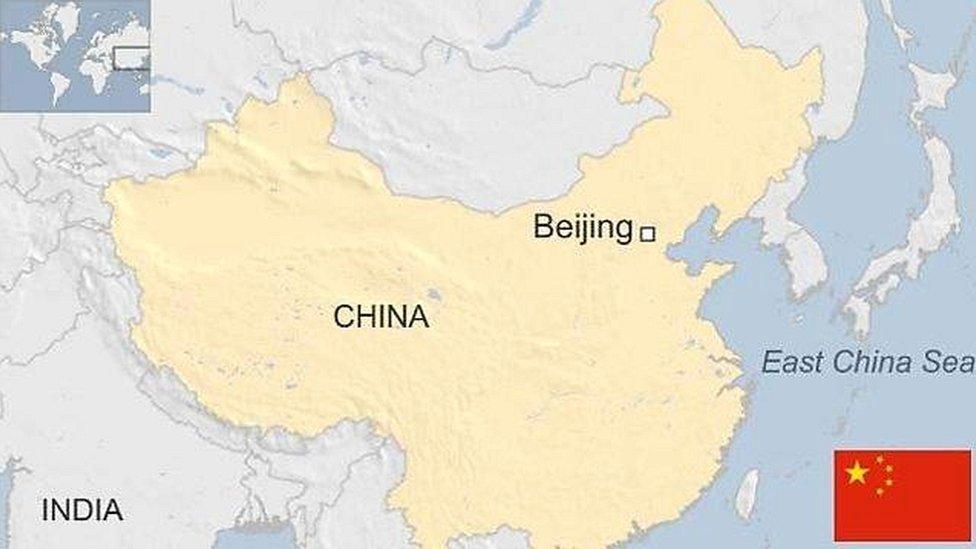China Kunming knife attack: Security tightened
- Published
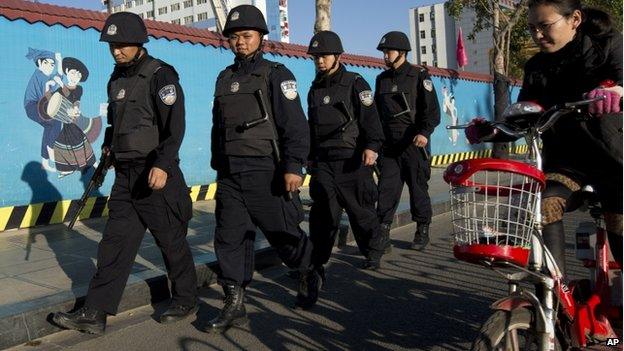
Kunming authorities patrolled near the railway station on Monday
Security has been tightened in south-west China's Kunming following a mass knife attack, as witnesses described horrific scenes at the attack.
Several men and women burst into Kunming station, south-west China, on Saturday, stabbing people at random and wounding more than 130.
Officials have blamed separatists from the Xinjiang region for the attack.
China's security chief, Meng Jianzhu, has vowed "all-out efforts" to "severely punish terrorists".
Mr Meng condemned the "brutal attack on defenceless, innocent people by violent terrorists" in quotes carried by the state-run Xinhua news agency.
There are at least 10 suspected attackers, with four shot dead by police at the scene, Chinese state media report.
A female suspect was detained and is receiving treatment for injuries, reports say.
Eyewitnesses said the attackers used curved swords and meat cleavers to stab people at random.
A parking attendant at the scene, identified only by his surname, Chen, told Reuters news agency: "I saw five or six of them. They all had knives and they were stabbing people madly over by the first and second ticket offices."
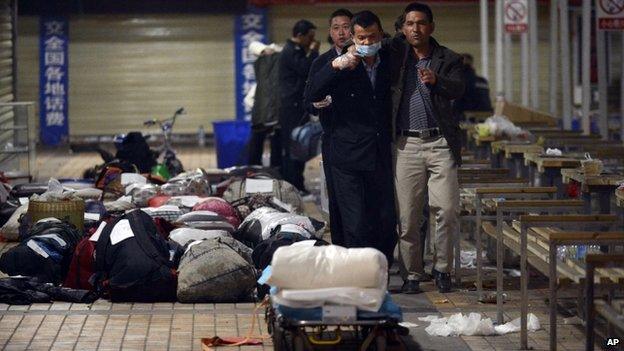
Saturday's attack wounded at least 130, with terrified onlookers abandoning their luggage as they fled
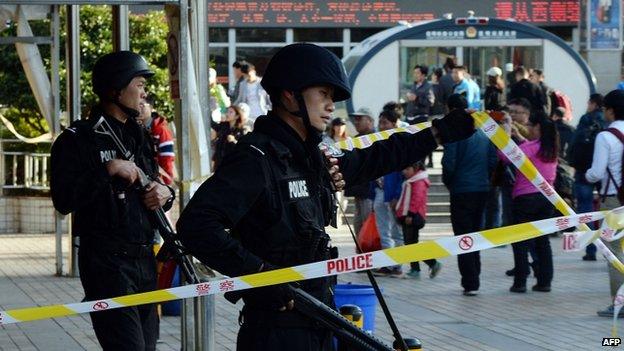
China's authorities vowed to use "all out efforts" to find and punish the attackers
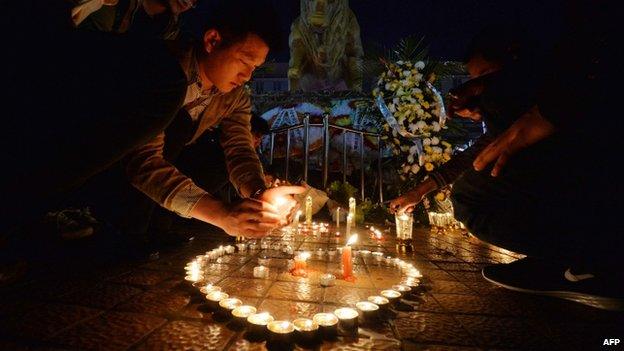
A vigil for the victims was held outside Kunming's main train station on Sunday
Another witness, student Chen Zihong, told the Beijing Times that she noticed something was amiss after she saw two men fighting.
"We were very afraid, and lots of travellers were running around, terrified," she said.
Chen Yugui, a hostel worker who was at the station during the attack, told the paper he saw more than ten bodies lying on the ground.
"The smell of blood was in the air, and there were lots of people crying," he said.
On Sunday, the UN Security Council , externalsaid it condemned the attack "in the strongest terms".
UN Secretary General Ban Ki-moon, external described the attack as "terrible", adding: "There is no justification for the killing of innocent civilians."
'Feelings of grief'
Kunming is the capital of China's Yunnan province. On Monday, security was tight, with a heavy police presence at Kunming station and surrounding areas.
Security checks at Kunming's Changshui International Airport were stepped up on Sunday, Xinhua said, while reports suggested there was also a greater police presence in China's capital, Beijing, on Monday.
A memorial for the victims has been set up at Kunming station's concourse.
More than 100 people attended a vigil at the station on Sunday night to mourn the victims, the South China Morning Post (SCMP) reported.
Kunming resident Chen Bing said: "I hate those terrorists. I want to in any way I can express my feelings of grief for those killed and injured."
Another man at the vigil, who did not wish to be named, told the SCMP he was saddened by the incident but concerned over problems in Xinjiang.
He said: "We were never told why there was so much unrest there... what did our government do there to attract that much anger?"
Chinese authorities said evidence from the scene pointed to separatists from Xinjiang - a region in the far-west of China bordering Central Asia - as being behind the attack.
However, no details were given and the claim could not be verified.
Xinjiang is home to the Muslim Uighur minority group. Recent months have seen several violent incidents there which the government has blamed on extremists. Verifying these reports is difficult because foreign journalists' access to the region is tightly controlled.
China is often accused of exaggerating the threat of Islamist terrorism to justify its harsh security crackdown in Xinjiang and the restrictions it places on the religion and culture of the Uighurs.
Beijing is certain to argue that the scale and shocking brutality of this attack shows that the threat is real and serious, correspondents say.
The incident comes a few days before the opening of China's annual parliamentary session, the National People's Congress, where domestic security is expected to top the agenda.
Last October China blamed Xinjiang separatists when a car was driven into a crowd of people on the edge of Beijing's Tiananmen Square, leaving five dead.
- Published3 March 2014
- Published2 March 2014
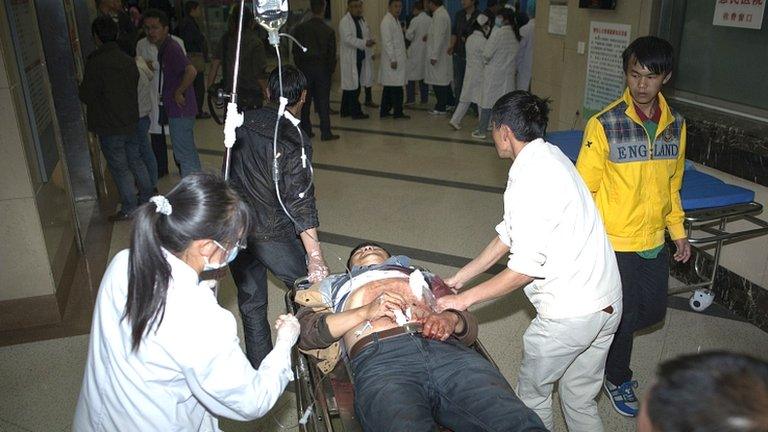
- Published3 March 2014
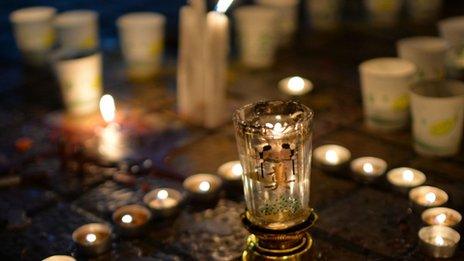
- Published2 March 2014
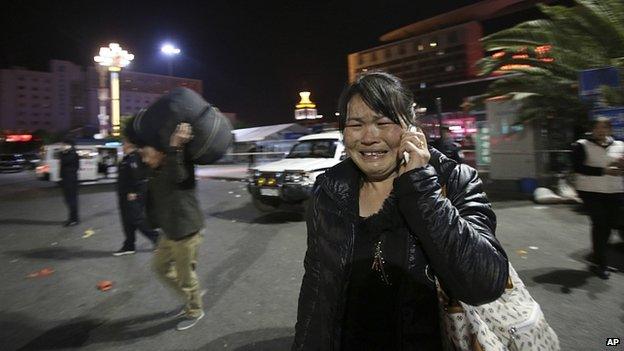
- Published25 August 2023
